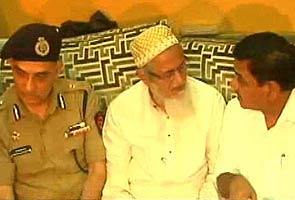
Mumbai: Vasant Tarte, a police constable in his early 40's has a grueling schedule. But in spite of that he makes time to visit the Memon couple every single morning.
The Memons are senior citizens in their late 70s, living alone in Mumbai.
Mr Tarte, a father of two has adopted the couple and pledged to take care of them. It's not by way of adoption under the Hindu law but as part of a drive initiated by the Mumbai police to instill confidence in senior citizens- who are considered the most vulnerable section of society.
"En route to work I drop by to check on them. I know them as I have been serving at the Nagpada police station for over two years and they live opposite the police station, but after the drive I started frequently interacting with them," an emotional Mr Tarte tells NDTV while explaining the campaign.
"I feel home when I come here. Their kids have settled abroad so they feel lonely. Serving them reminds me of my parents who stay alone in my home town in Satara ", adds Mr Tarte.
The Memons are only too happy talking about their 'son'; "We feel nice when he comes over. Our kids aren't in India so we feel lonely. He fills the vacuum," Mrs Falusa Memon tells us. "We are scared reading about the spate of attacks on elderly citizens and hope that this drive is successful," she adds.
But not every senior citizen has a happy story about the police. Malvika Jhaveri, a 68-year-old resident of Gamdevi in South Mumbai was robbed at knife point by two unidentified men who barged in to her house in August this year and robbed her off jewellery worth 14 lakhs.
"They handcuffed me and tied me to a chair and took away all my jewellery," says Mrs Jhaveri.
Bitter and scared, the Jhaveris have now installed CCTV cameras outside their home and hired a personal security guard.
"We have no faith in the police so we have hired a guard at our expense," she adds.
The police are hoping to change that by initiating this drive especially after a spate of attacks on the elderly.
Six senior citizens were killed and over 40 cases of chain snatching registered in just one month. All with the motive to rob the helpless.
On October 1, the Memon's had a surprise visitor - the state home minister RR Patil who had come to take a stock of the drive.
"We will ensure that all the senior citizens are registered and a constable visits them regularly," he told media.
As part of the drive, one needs to register themselves with the local area police or call them on the elderly helpline number - 1090. The police promise a dedicated constable would be assigned to meet senior citizens in his area and keep a constant vigil on them.
"This won't strain the police force. This is part of its social obligation and we are too happy to help, "says police commissioner Satyapal Singh, when asked if the police force that's already understaffed and over work was being pushed to the wall.
The sincerity is apparent, but the attacks on senior citizens not only expose the loopholes in policing a metropolis like Mumbai but also reflect the growing social realities where the elderly are forced to live all by themselves.
STEPS TO ENSURE YOUR SAFETY
1) Call 1090 in any emergency
2) Stay in touch with the local police
3) Register yourself and submit details to them
4) Register your domestic help
5) Give details about the point of contact person during emergency
PRECAUTIONS THE ELDERLY MUST TAKE
1) Install grills on the door
2) CCTV in the building
3) Reconfirm visitors' identities
4) Not keep too much jewelry or cash at home
5) Not befriend strangers.





Comments
Add new comment